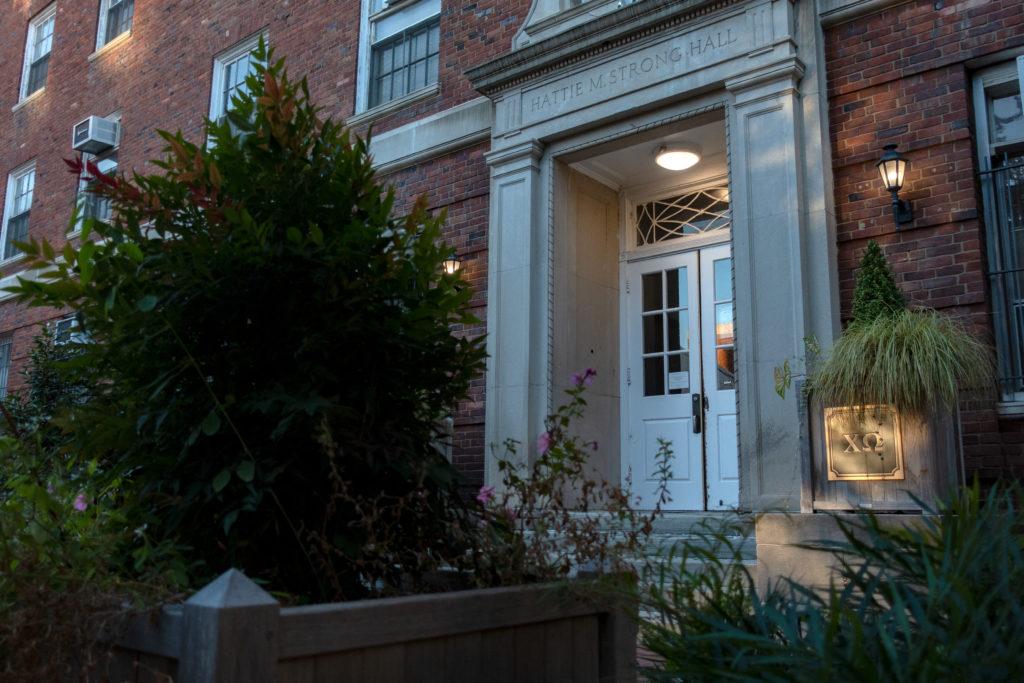The Residence Hall Association is prioritizing engagement with new students to gather feedback on housing through outreach to residents of affinity, fraternity and sorority houses and first-years during orientation.
Vero Famadas, the president of RHA and a junior studying psychology, said they plan to attend freshman orientation events to establish RHA as a resource for students early in the year and build interest for the four available hall council positions in each residence hall — which plan events for individual residence halls — especially in nontraditional residence halls like Casa Cisneros and Greek townhouses. They said the RHA’s two main priorities for the upcoming year are continuing to build community in residence halls and encouraging residents to raise potential concerns about their residence halls with administrators.
“I’m really happy to talk about the different things that we’re working on, whether it’s inclusive housing, whether it’s just accessibility or just kind of making sure that we represent the people living in the halls and that we have a voice,” Famadas said.
Famandas said they have worked this summer to get to know their 14-person executive board — a number standard for the organization — on a personal level and set common priorities for advocacy this year, like accessibility in residence halls for students with disabilities and gender-inclusive housing.
“I’ve been really lucky that my e-board has been quick on their feet, so enthusiastic,” Famadas said. “It’s honestly refreshing because it makes me want to keep working on it.”
Famadas said the RHA e-board spoke and handed out T-shirts at the Buff and Blue Kickoff last week and will give away snow cones, sunglasses and beach balls at a pool party on the Mount Vernon Campus Wednesday.
“It’s scary coming in freshman year, and I just want to make sure that we build a community early on,” Famadas said.
Famadas said applications for hall council positions are due Sept. 10, and the RHA will hold information sessions — starting Sept. 5 — and candidate meetings on both the Foggy Bottom and Mount Vernon campuses. They said hall councils on the Vern tend to be more enthusiastic in their roles because the Vern offers a more traditional residence hall experience.
“Actually, the Vern has been the most energetic, enthusiastic group of RHA ever since I’ve been a freshman,” they said. “They have an energy.”
Famadas said most members of RHA’s e-board previously served on hall councils but are new to organization-wide leadership. During their two meetings this summer, Famadas and the rest of the RHA e-board listed concerns over dining, accommodations for students with allergies, gender-inclusive housing and housing accessible to students with disabilities as potential areas of advocacy for the upcoming year.
Famadas said they plan to seek specific feedback from hall councils before advocating on their behalf and addressing issues. They said they plan to seek feedback on the move-in process as a first step for advocacy after students have moved into residence halls.
The RHA, in conjunction with the Student Association, published a report detailing security, accessibility and maintenance issues in residence halls in April.
Famadas said their e-board will meet weekly during the upcoming year, which is typical of past years.
Famadas said the RHA plans to establish hall councils in nontraditional residence halls in RHA programming during the upcoming year, like the Greek townhouses, Strong Hall — which houses Chi Omega, Kappa Alpha Theta and Pi Beta Phi sororities — and Casa Cisneros, which houses students focused on service and leadership in the Latino community. They said RHA’s bylaws already dictate that each participating sorority of Strong Hall would provide a representative for the hall council and that the RHA hopes to carry out the existing policy.
They said they hope to create a stronger sense of community in these nontraditional halls by providing RHA supplies, like the popcorn machine, cotton candy machine, chocolate fountain and snow cone machine.
“They definitely would use a lot of the supplies and just a lot of the resources that we can offer,” Famadas said. “And I would love to just give RHA to as many halls as possible.”
Famadas said they met with the executive director of GW Dining, Douglas Frazier, at the beginning of the summer to address a student’s allegation of other students using batter containing gluten in the gluten-free waffle makers at dining halls. They said Frazier “immediately” agreed to move the waffle makers behind a counter so dining employees can operate the machines instead of students.
“It shows that they’re in touch with our student feedback, and I’m really happy about that,” Famadas said.
They said they have met individually with Dan Wright, the director of campus living, twice this summer to establish goals for the year and plans for using RHA’s new meeting space in the basement of South Hall after it moved from the fourth floor of the University Student Center over the summer.
“We want it to be open to everyone, not just those in RHA,” Famadas said.
Famadas said they will meet with Wright every other week during the school year. They said members of their e-board held individual transition meetings with members of last year’s team to learn what the previous team worked on and decide future steps.
Arielle Geismar, the former RHA president and current SA president, said she hopes this year’s administration is able to address any potential issues that arise due to the new swipe-based system at dining halls that officials launched at the beginning of last semester, a departure from the previous system where students could spend a declining balance at local restaurants and grocery stores.
“I want to try to make sure that transition goes smoothly,” she said.
Geismar said last year the RHA collaborated with nontraditional residence halls, like Greek townhouses, but they were not “close.”
She said that last year the RHA filled all hall council positions, which did not include Casa Cisneros or the Greek housing. In 2019, students contested only 60 percent of the races for 135 hall council positions, after the RHA filled a record 132 spots — 98 percent — in 2017.
Geismar said she designated opportunities over several weeks for new members of the RHA e-board to shadow the previous members.
Diego Carradero, an international affairs and political science major and executive vice president for RHA, said this year, RHA removed the vice presidential role in hall councils, meaning each of the four members of each hall council — president, treasurer, communications chair and programming chair — can take a more active role in their positions.
“That’s definitely something that’s going to be a bit experimental with us,” he said.
Carradero said RHA hopes to raise students’ awareness of their organization as part of student government, distinct from the SA. He said the pandemic negatively impacted awareness of RHA because students did not live in residence halls, and the organization was unable to hold in-person events.
“In general, we are definitely investing a lot in our resources so that we can give out more,” he said.








